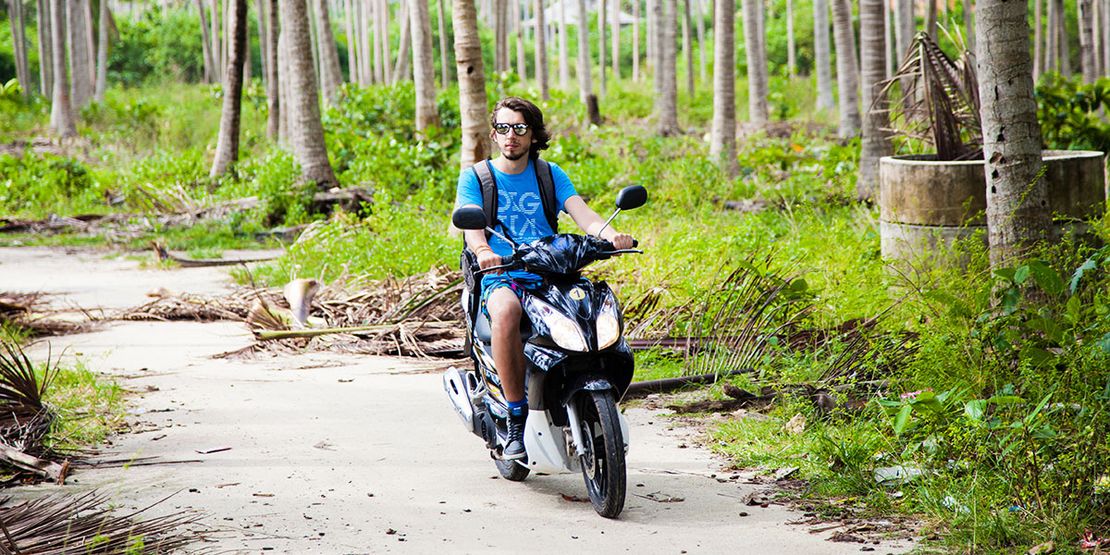Motorbikes in Thailand: Explore Ways to Rent the Best
Renting a motorbike in Thailand can be an excellent way to explore the country on schedule and at your own pace. However, being aware of the risks and challenges involved is crucial, especially if you're unfamiliar with driving in Thailand.
To ensure a safe and enjoyable experience, taking some precautions and being aware of what to be prepared for when renting a motorbike in Thailand is essential. In this guide, we'll cover everything from choosing the right bike and checking for damage to understanding local traffic laws and staying safe on the road.
With these tips, you'll fully enjoy the freedom and flexibility of renting a motorbike in Thailand while minimizing the risks. So, let’s get started!
Best Way to Rent a Motorbike in Thailand
Renting a motorbike in Thailand is easy, cheap, and rental places are everywhere. The best way to get around in any local area of Thailand is likely to be on a motorbike. Most rentals are only 200-300 Thai Baht. They use very little gas, and as many as three adults can climb on! Many honest rental shops provide a good service. However, there are also entirely too many disreputable renters.
Tourist scams are common, and your price could go way up if you are not careful. A license is needed when renting a motorbike in Thailand, but this is not always enforced in tourist areas. I must also emphasize that experience riding a motorbike is essential, no matter how easy it looks. Thailand has an astonishing road death rate, and motorbike accidents are the number one cause of tourist deaths in Thailand.
Motorbikes in Thailand
As the term implies, motorbikes in Thailand are just that: bikes with motors! Most motorbikes are from 100-250 cc, and the majority are in the 125 cc class. These are not what Europeans and Americans call motorcycles. They are called motor scooters there. There is a class called “Big Bikes” in Thailand for motorbikes over 501cc, but these are far less common. The reason is simple - Thailand's roads outside the major cities are rough, and city traffic is terrible. So, a light, nimble machine makes the most sense.
The most crucial difference for experienced MC riders to know is that motorbikes don’t turn the same way. On a “normal” motorbike, you lean the bike over into the turns. With a Thai motorbike, you need to turn the broomsticks to a varying degree in accordance with speed. And the turns on Thai roads are easy to misjudge.
5 Known Motorbike Rental Scams in Thailand
Rightly or wrongly, Thailand is known for scams involving tourists renting motorbikes. These are logically concentrated in the tourist areas and take advantage of foreigners’ excitement to get out and ride. Here are the top five ways scammers can get you if you are not careful.
#1 The Passport Scam
Many rental places want you to leave your passport with them as “security” for the rental. This is illegal; you don’t have to give it to them. Let them make a copy instead, and watch them when they do. You are required by Thai law to always have your passport with you! If you leave it with the rental place, you might get stopped by the police and get in more trouble. The other thing that can happen is you can get set up to have your passport held for ransom. All of a sudden, mysterious damages can pop up, and they won’t give it back until you pay!
#2 The Fake Damage Scam
So far, this is the most common, and you might think it is easy to prevent it by taking some pictures. That does help, but it is not something to be sure of. Often, a sticker is somehow peeled, or scratches on the bottom are discovered that you didn’t have in the pictures. This gets worse if only the renter took the pictures with their phone instead of you using yours too. If the renter keeps insisting on this scam, you will have to take things to the authorities. Just the threat of that will often diffuse the situation.
#3 The Deposit Scam
It often seems logical that the renter will want some security deposit on a motorbike rental. What you need to watch out for is how much. For instance, a 10,000 Thai Baht deposit is ridiculous when the most damage you can do without killing yourself is only a couple thousand! This is especially true with the older bikes most places have for rent. And the deposit is also a perfect setup for the fake damage scam!
#4 The Tire Scam
This one is particularly hard to catch and is disturbingly common. A tire will be defective, and you can’t tell until you leave the road far from the rental shop. You call with a problem or bring it back with a flat, and you get all kinds of charges. Even good pictures will not help avoid this one. You can ask for a tire gauge and tell them you will check it on the road. Or, say that if the skin goes flat and there’s no fault of yours, you are not paying. Again, the threat of action has a good chance of preventing the scam.
#5 The Repair Shop Scam
This is a setup that is only easy to recognize when it is too late. What happens is you get sent to a particular repair shop if there are any damages, real or fake. This repair shop colludes with the renter and gets money kicked back by charging you more for repairs. The only recourse you have is to get other estimates in a small place that might not even help.
Extreme Motorbike Rental Scams
Two things can happen in cases where somebody has made you out to be a target. These things are a bit extreme but are reported because they happen. One is that you get set up to have your rental bike stolen by somebody with a second key. This is the opening for the scammers to jack up the charges. They will want you to replace the bike - with a new one!
Worse, since the rental scammers know you are out of your hotel room for the day or longer, they take the opportunity to rob your hotel room. They might not do this themselves, but the setup is there. These are just cases to be aware of. They are not common because of the heightened danger to the scammers.
Tips for Renting a Motorbike in Thailand
- Try your best not to leave the motorbike - unattended! At the very least, try and leave it in full public view.
- Rent from a reputable place. Big names like Avis or Hertz are the best, but also the most expensive. It is likely worth the extra cost.
- Use a helmet, even if you see no one else using one. It is the law, but that is often ignored everywhere in Thailand.
- Don’t speed! Speed kills. This is true! You don’t need the law to tell you that.
- Use usual MC caution. Be careful of gravel and wet roads. Be especially careful on sandy spots! These can throw you even worse than water. Also, stay out of challenging braking situations.
- Don’t leave valuables on the bike, even in its storage areas.
Best Ways When Renting a Motorbike
The old saying is an ounce of prevention is worth a pound of cure (do the metric conversion if you have to). Having good travel insurance is the best interpretation of this. Make sure to get a policy that covers rentals like motorbikes and passport problems. Take a test ride on any bike you rent. Check the skins, and make sure it starts over and over.
Also, make sure you understand with the renter how long you are renting for. They don’t always assume 24 hours like other places open for extra charges.
Just as important as all this is another old saying that is particularly true in Thailand. “Don’t lose your cool!” Stay calm and try to work things out. If authorities need to be involved, call the Tourist Police first. They are more in tune with foreigners and more likely to understand your side and not immediately take sides with the Thais involved.
So, until next time... Rumble on!
D (Big Bear)
A software developer by trade, CTO by profession, motorcyclist and touring enthusiast, family man, tech lover, minimalist, tech leader, expat/immigrant, and above all, a free spirit.
The Bear Travel | Experience like a Local
A fast-growing Thailand Travel Blog written by Expats and Thais since 2017. We will share our experiences and ideas from an insider point of view for you to create your own unique Thailand experience.
For the latest news and events about The Bear Travel, follow us on Facebook, Instagram, Twitter, Pinterest, or YouTube.
For any issues, concerns, or queries, don’t hesitate to CONTACT us.
Recommended for you
What does LGBTQ+ Means: A Quick Guide
LGBT Bear
Shrimp Farming: Essential Terms and Definitions for Beginners
Riley Sinclair (Digital Aqua Bear)
30 Days in Thailand: How Much Money Do I Need?
Dr. Theodore (Professor Bear)
Top 10 Best Bisexual Dating Apps You'll Surely Love
Jordan (Bisexual Bear)















